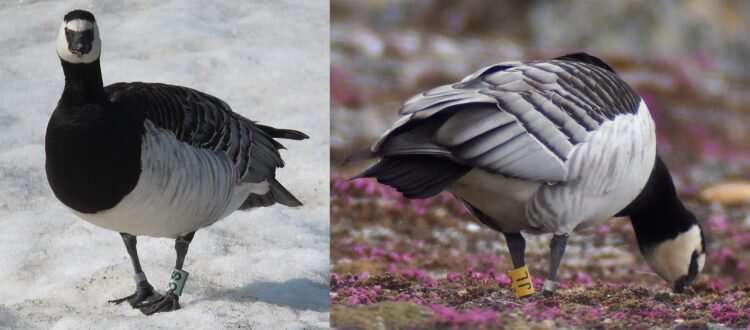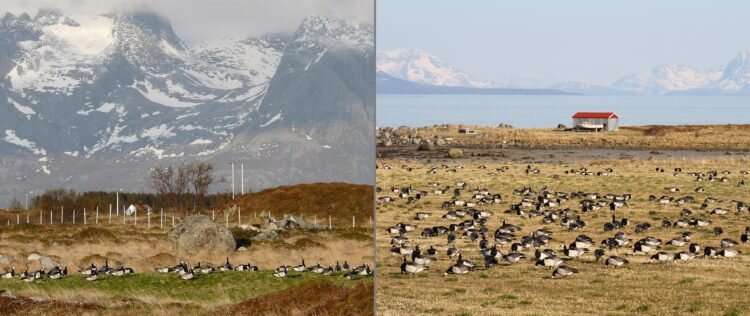Wild geese take climate action

Migratory animals are actively adjusting their traditions to climate change, new research has found.
An international team of researchers from the University of St Andrews, with Norwegian, Dutch and British colleagues, found that barnacle geese have shifted their migratory route within the last 25 years.
In research published today in the journal Global Change Biology, the research team concluded that individual geese have decided to change to the new route, and that other geese now learn the new habit from each other.
The study is among the first to provide hard evidence that wild animals are inventing new traditions to cope with climate change.
The migratory birds, who traditionally fueled up (staged) just South of the Arctic circle in Norway on their journey from the UK to their breeding grounds on Svalbard, now mainly stage in northern Norway far above the Arctic circle.
The conclusions are based on analysis of 45 years of observations by the Norwegian Institute for Nature Research, the University of St Andrews, the University of Groningen in the Netherlands, BirdLife Norway and the British Waterfowl and Wetlands Trust.
Dr. Thomas Oudman of the School of Biology at the University of St Andrews said: "It makes sense that the birds went even further North, because where snow used to be very common there at the time of their arrival in Norway, these days it is often freshly green there: the most nutritious stage.

"What surprised us is that it is mainly the young geese who have shifted. The youngsters are responding to a trend they could not have experienced during their short life."
Adult geese are also increasingly shifting north, although they often return to the traditional area in their old age.
Dr. Oudman added: "These patterns point at a complex social system, which enables the geese to rapidly colonize newly available areas."
Contrary to most other migratory birds, barnacle geese flourish even while their natural habitat is rapidly changing.
Barnacle geese are able to adapt to climate change due to the availability of alternative places with sufficient food at the right time, and without the threat of disturbance from humans or other dangerous animals.
The availability of alternative habitats may also help other animals to adapt to climate change. Animal species that are not so explorative and which are less sociable may take much longer to discover such places.
The paper, "Northward range expansion in spring‐staging barnacle geese is a response to climate change and population growth, mediated by individual experience," is published in Global Change Biology.
More information: Ingunn M. Tombre et al. Northward range expansion in spring‐staging barnacle geese is a response to climate change and population growth, mediated by individual experience, Global Change Biology (2019). DOI: 10.1111/gcb.14793
Journal information: Global Change Biology
Provided by University of St Andrews
















